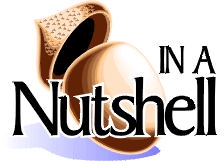Nutshell
The nutshell is a small organic capsule used for storage of words, phrases and short sentences. Its lack of storage capacity (compared to, say, the paper) has often forced complex messages and pieces of information to be summarised in as few words as humanly possible.
An anonymous wise old man, believed to have lived thousands of years ago, is often quoted “the nutshell is mightier than the sword”, possibly because the nutshell is notoriously tough and difficult to break. Indeed, this quote is believed to be a main factor in prompting the use of nutshells in military warfare. However, recent analysis made on the historic quote suggests the translation was not entirely accurate, and that ‘nutshell’ should actually be read as ‘nutcase’. This changes things somewhat, albeit the meaning of the quote is still dubious. The tendency to belief that the old man was rather a nutcase himself is increasing in popularity.
Society’s need for information in a nutshell[edit]
Information is often given in nutshells. This is because people of today are either too stupid, or too lazy to read anything complex or long. Statistics show that 4 out of 5 people will have stopped reading this paragraph already because the sentences are too large for their puny brain to handle. Their brain cells cry out in agony, screaming “make words small! We no get!”. Observing a thick person listening to a big sentence can be a painful experience, both for the watcher and for the halfwit him/herself. Firstly, after surpassing the 5-word milestone, the subject’s eyes will start to bulge. By 9 words, the observer may hear small popping sounds emit from the subject’s head. This is the sound of brain cells exploding. If the sentence continues for more than 18 words, the subject will collapse, and will require immediate medical attention. Writing a summary of the sentence, placing it within a nutshell, and presenting it to the subject will help recover the individual and soothe the pain. That was some medical advice in a nutshell.
Businessmen also crave nutshell information. This is because they want to appear busy. Appearing to have time for big words makes them look like slackers, and if they look like slackers their boss might cut their 20-second lunch break in half again. Businessmen particularly like acronyms due to their condensing qualities, and work exceptionally well in nutshells. For example the command “fix the Electrically Erasable Programmable Read Only Memory as soon as possible!” can be condensed to “Fix EEPROM ASAP” in a nutshell. To save more time, it has also been proposed that businessmen should dream in nutshells. That’s the American Dream in a nutshell.
Military Uses[edit]
Nutshells have been used in the military for thousands of years. Many believe the Battle of Waterloo in 1815 was won with the nutshell. Britain put messages in the nutshells and loaded them into their muskets, firing upon the French. Although the nutshell dealt little physical damage, upon impact they broke open revealing messages such as “You snotty froggies shall go back from whence you came!” and “Napoleon is short and stupid. Everything goes over his head”. Historians question this however, asking how the French understood the messages they were being given. Regardless, the French lost, the British won, and that’s the Battle of Waterloo in a nutshell.
The Squirrel Conspiracy[edit]
A squirrel’s habit of burying a special form of the nutshell named the Acorn, which is capable of withholding considerably complex data, has lead many to voice beliefs of a secret squirrel plot to do “something nasty” to society. It is difficult to deduce quite what these plans are for many reasons, such as:
1) They are hidden well and buried deep
2) The language the data is written in is squirrelish
3) Humans are incapable of understanding the complex long sentences and big words associated with acorn-ic discourse. We just want things in a nutshell.
Case Study: Experts in Iceland soon came to believe that squirrels have discovered means to place small pressure-triggered explosives within acorn shells. This led many parks in the country to close and be labeled as potentially hazardous minefields. Nutshells were posted through the letterboxes of many residential areas that were thought susceptible to high levels of squirrel activity, containing the warning “Squirrels will kill you. Flee!” The great Icelandic evacuation signified the starting point of the second “potentially-nuclear” war with squirrelkind. Many experts believed squirrels were developing acorn-firing artillery made from tree trunks. The war was finally considered to be subject of scaremongering however, when some smart guy pointed out that no squirrels actually live in Iceland. That’s the Great Icelandic Squirrel Conspiracy in a nutshell.
The Pea-nutshell Myth[edit]
Some people claim the existence of the pea-nutshell. This is quite obviously ridiculous, as peas do not have shells. They do however have pods, which work like nutshells in many respects. The peapod, alongside the escape pod and the iPod, are good for containing things, albeit their role is much more specific. Unlike the peapod’s ability to hold only peas, the escape pod’s ability to house only scared, fleeing robots and laser-gun-wielding humanoids, and the iPod’s ability to contain, presumably, i’s; the nutshell is much more diverse. The best scientists and programmers in the world are, however, still unsuccessful in their attempts to make the nutshell compatible with mp3 files. Hence the iPod has one over the nutshell. Damn. But then nutshells are natural and free. And they leave no carbon footprint, which wont be possible for Mac until they make their apple iPods actually out of apples. So there. And that’s the pea-nutshell myth solved, without audio, in a nutshell.

